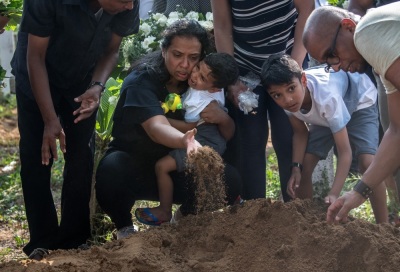Christians massacred: Call to grieve

On Easter Sunday, nearly 300 worshipping Sri Lankans were killed in a terrorist attack that injured an additional 500. As a Christian enjoying the holiday with the comfort of my family back at home, it was horrifying to see news updates about the attack on what should be a safe and sacred day. Since the event, I’ve seen many charitable Christian groups lift their voice about how we need to aid the Sri Lankans. While I agree that we need to extend our hands in both a practical and a prayerful sense, I think there is a preliminary step we’re forgetting in the middle of all of this, it’s something we as Christians often forget: the call to grieve.
Have these tragedies become so common in this day and age that our culture isn’t even phased? Do we actually stop and mourn for the fallen Christians, who were murdered simply for believing? When our brothers and sisters are massacred for the faith that we are not endangered by here in the United States, do we feel a sense of heaviness to grieve? We should, because Jesus did.
Arguably the most famous Bible verse of all time, “Jesus wept,” shows us the godly example of grief. That verse is preceded by Jesus hearing that his friend Lazarus is gravely ill. To this, He responds that “this sickness will not end in death.” Ultimately, it doesn’t because Christ raises Lazarus from the dead, transforming a tragedy into a testimony of His glory. However, when He arrives at Lazarus' home town and learns that His friend is already lying dead in the tomb, He, Jesus, the Son of God, “groaned in the spirit and was troubled.” Then, he wept with Lazarus’ sisters, mourning those moments of a world without his dear friend.
This is just one of the many biblical examples of grief proceeding practicality. We are absolutely called to trust and hope in the Lord, but we get it totally wrong when we think that tears aren’t part of the healing process or that being a good Christian means pretending no part of death is sad, simply because the person who has passed is in a better place. Forgive me, but I think that if the Son of God cried and wept, then maybe we should too.
Matthew 5:4 tells us “blessed are those who mourn, for they shall be comforted.” I’m pretty sure God isn’t in the business of blessing things that He does not condone. Why would He say this, in addition to things like “the Lord is close to the brokenhearted” if paying homage to grief wasn’t important?
We see this also in the Old Testament when the great king and psalmist David wrote that “He heals the brokenhearted, He bandages their wounds.” I could go on and on, but Scripture shows us that God isn’t disturbed or annoyed by our grieving because it isn’t a sin to be sad. He is HERE for us, and if we are made in His image, I think that means God feels righteous anger, sadness and grief similarly to how we do.
Jesus was perfect and He lived a sinless life. So, if the best thing for Him to do after learning that Lazarus was dead was to immediately go to him and heal him, Jesus would have done just that. But He didn’t. The right thing was to first grieve with Lazarus’ sisters and then work a miracle. When Jesus wept and the onlookers saw, the Jews remarked of Jesus and Lazarus’ relationship, “Oh, see how He loved him!”
It is good to want to help our Sri Lankan brothers and sisters. Yes, we should lift up our hands and pray for those who are being persecuted. It’s true that James said “faith without works is dead,” because it is no good to pray only and not attempt to meet physical needs when someone comes to us for help. But how they will see God’s love through us if we do not show His loving kindness?
I don’t think we can safely say either that Jesus was just crying sympathetic tears since Scripture tells us how troubled His heart was. Seeing His tenderness and compassion toward Lazarus and his family reminds me of the intense anguish our Savior suffered leading up to His death on the cross. He prayed in the garden of Gethsemane for hours to the point of sweating drops of blood! I don’t know about you, but I find it beautiful and touching to see that our perfect God experienced some of the most straining emotions a body can know, and yet it did not make Him any less holy.
Following Christ’s example, I am grieving for our fallen brothers and sisters in Sri Lanka. My heart is heavy about the grave injustice inflicted during the attack, and my soul is troubled for the evil pressing in all around us. I hope that we are all eager to come to Sri Lanka’s aid and put our faith to work, but we must not ignore the call to grieve. What impact do our good works have if our care and empathy are not evident? I choose first to weep.



























